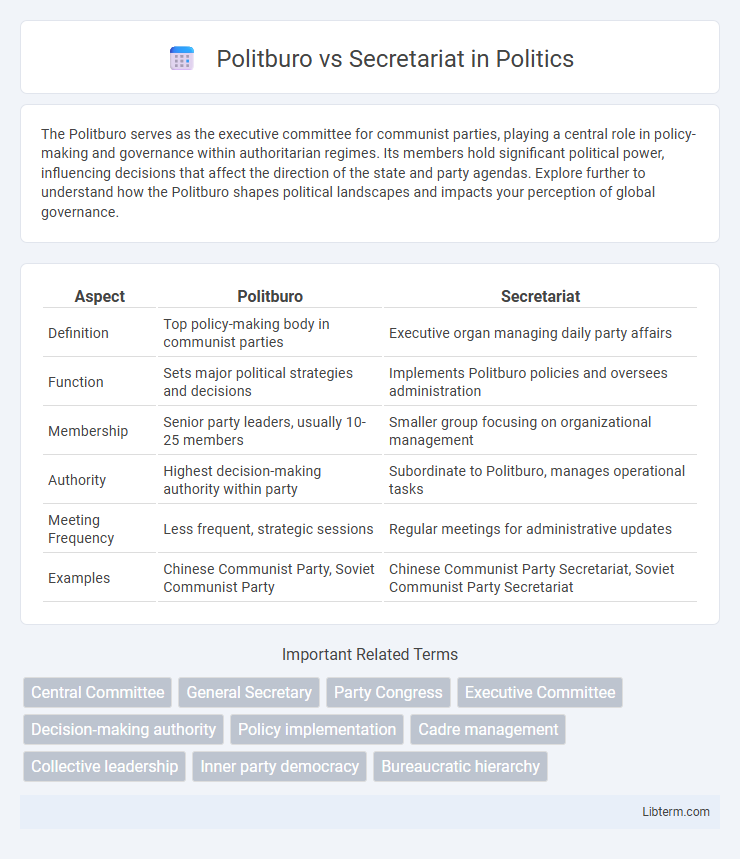The Politburo serves as the executive committee for communist parties, playing a central role in policy-making and governance within authoritarian regimes. Its members hold significant political power, influencing decisions that affect the direction of the state and party agendas. Explore further to understand how the Politburo shapes political landscapes and impacts your perception of global governance.
Table of Comparison
| Aspect | Politburo | Secretariat |
|---|---|---|
| Definition | Top policy-making body in communist parties | Executive organ managing daily party affairs |
| Function | Sets major political strategies and decisions | Implements Politburo policies and oversees administration |
| Membership | Senior party leaders, usually 10-25 members | Smaller group focusing on organizational management |
| Authority | Highest decision-making authority within party | Subordinate to Politburo, manages operational tasks |
| Meeting Frequency | Less frequent, strategic sessions | Regular meetings for administrative updates |
| Examples | Chinese Communist Party, Soviet Communist Party | Chinese Communist Party Secretariat, Soviet Communist Party Secretariat |
Introduction to the Politburo and Secretariat
The Politburo serves as the principal policymaking committee in a communist party, wielding significant influence over government decisions and strategic direction. The Secretariat manages the day-to-day administrative operations and ensures the implementation of Politburo policies, acting as the organizational backbone. Together, these bodies coordinate to maintain party discipline, streamline governance, and execute political agendas efficiently.
Historical Origins of the Politburo and Secretariat
The Politburo and Secretariat originated from the organizational structures of early communist parties, with the Politburo first established during the Bolshevik Party's 7th Congress in 1917 to serve as the principal policymaking committee. The Secretariat was created shortly after, tasked with the day-to-day administrative functions and overseeing party discipline and appointments. These bodies evolved to provide centralized leadership, with the Politburo focusing on strategic decisions and the Secretariat managing operational execution within communist party hierarchies.
Core Functions of the Politburo
The Politburo serves as the principal policymaking committee of a communist party, responsible for setting major political, economic, and social strategies. It oversees the implementation of party decisions at the national level and guides overall state governance through collective leadership. Unlike the Secretariat, which manages day-to-day party operations and administrative affairs, the Politburo focuses on high-level decision-making and directing key policy initiatives.
Key Responsibilities of the Secretariat
The Secretariat in a communist party primarily manages the day-to-day administrative operations and oversees the implementation of Politburo decisions, ensuring organizational coherence and party discipline. It is responsible for coordinating the work of various departments, managing personnel appointments, and supervising routine political and organizational activities. While the Politburo sets broad policy and strategic direction, the Secretariat functions as the executive body that enforces these decisions and maintains internal party administration.
Differences in Structure and Membership
The Politburo, typically larger, functions as the principal policymaking committee within communist parties, comprising key party leaders and government officials, whereas the Secretariat is smaller, focused on administrative and organizational tasks, including implementing Politburo decisions. Membership in the Politburo often includes prominent figures such as the party general secretary, ministers, and military leaders, while the Secretariat consists mainly of secretaries responsible for specific party functions, like propaganda or personnel. Structural differences reflect their roles, with the Politburo operating as a collective decision-making body and the Secretariat serving as the executive arm managing daily party operations.
Decision-Making Authority: Politburo vs Secretariat
The Politburo holds the supreme decision-making authority within the party, setting major policies and strategic directions. The Secretariat is responsible for implementing Politburo decisions and managing day-to-day administrative affairs. While the Politburo formulates the overarching political agenda, the Secretariat ensures organizational cohesion and operational efficiency in executing these directives.
Influence on Party Policy and Governance
The Politburo holds the ultimate authority in shaping party policy and governance, making key decisions that define the strategic direction of the Communist Party. The Secretariat manages the day-to-day implementation and enforcement of these decisions, ensuring organizational discipline and administrative efficiency. While the Politburo sets priorities and policy frameworks, the Secretariat operationalizes and supervises their execution across party structures.
Relationship Between Politburo and Secretariat
The Politburo serves as the top decision-making body within a communist party, setting broad policy directions and strategic priorities, while the Secretariat is responsible for overseeing the implementation of these policies and managing day-to-day party affairs. Members of the Secretariat are often drawn from the Politburo, ensuring coordination and coherence between decision-making and execution functions. This interlinked relationship enables the Politburo to maintain control and direction over party operations through the Secretariat's administrative machinery.
Comparative Analysis in Different Countries
The Politburo and Secretariat function as key organs within communist party structures, with the Politburo typically serving as the principal policymaking committee, while the Secretariat manages daily administrative affairs in countries like China, Vietnam, and North Korea. Comparative analysis reveals variations in power dynamics: China's Politburo Standing Committee holds supreme authority over the Secretariat, whereas in Vietnam, the Secretariat wields significant influence in organizational and personnel decisions under Politburo guidance. North Korea's unique structure places the politburo more as a formal body with actual power centralized within the Secretariat and the supreme leader, highlighting differences in operational roles and political control across these nations.
Conclusion: Impact on Party Leadership and Strategy
The Politburo holds primary decision-making authority, shaping the strategic direction and core policies of the party, while the Secretariat manages implementation and daily administrative tasks that ensure organizational efficiency. This division of responsibilities creates a balance in party leadership, where the Politburo sets priorities and long-term goals, and the Secretariat translates them into actionable plans. The coordinated interaction between these two bodies strengthens party governance, enhances policy execution, and maintains centralized control within the party hierarchy.
Politburo Infographic

 libterm.com
libterm.com